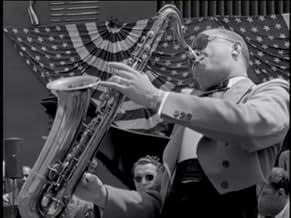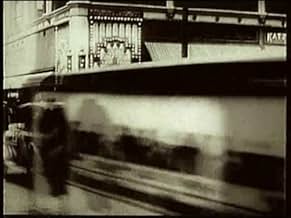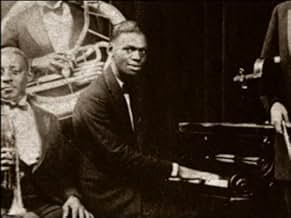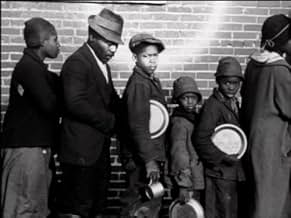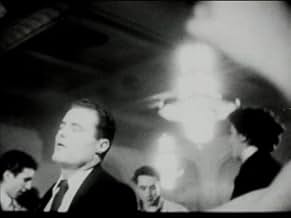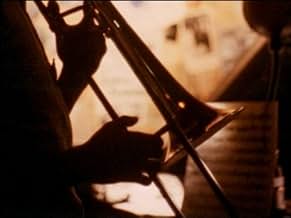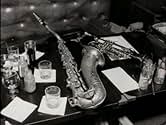Jazz: A Film by Ken Burns
- TV Mini Series
- 2001
- 1h 48m
IMDb RATING
8.6/10
2.6K
YOUR RATING
A survey of the musical form's history and major talents.A survey of the musical form's history and major talents.A survey of the musical form's history and major talents.
- Nominated for 5 Primetime Emmys
- 2 wins & 7 nominations total
Browse episodes
Featured reviews
It takes guts and talent to put together an idea like this and execute on it. Producer and director Ken Burns pulled off something we all wanted see in a documentary film. If it weren't for him, we may not have seen the likes of it in our life time. This near 20 hour epic takes Jazz from its roots to its modern day incarnations. I've learned quite a bit about history of jazz by watching this mini series, but I think the story told is little bit lop-sided. What Ken Burns failed (or purposely omitted) was the entire history of jazz guitarists. There's absolutely none represented in this series - zilch (!), and don't tell me that guitar wasn't an important part of jazz history. What Ken told was the story of jazz keyboard, and horn virtuosos. Not bad, but I still wanted to see some guitar in this series.
Martin Scorsese filled some gap with his "Blues" mini-series about blues guitarists, but a comprehensive history of jazz guitar history is still missing. Would some talented and daring director please take on the challenge ?
Martin Scorsese filled some gap with his "Blues" mini-series about blues guitarists, but a comprehensive history of jazz guitar history is still missing. Would some talented and daring director please take on the challenge ?
10RobT-2
As a jazz fan for over 20 years now, ever since I first encountered the 6-LP "Smithsonian Collection of Classic Jazz" in the library of the college where my father taught, I could go on and on about all the stuff Ken Burns and company left out. However, part of me keeps imagining some kid latching onto this program the way I did with the Smithsonian LP's, then searching out jazz recordings, books on the subject, and recent copies of "Down Beat" magazine. Multiply this scenario by an unknown number (hundreds? thousands, perhaps?), not just with literal kids but all kinds of people open to discovery in the same way, and you get some idea of how I feel about the program.
Speaking again as a longtime jazz fan, even though I was a bit disappointed that more "modern" and avant-garde jazz wasn't included, the portions of "Jazz" covering swing were a revelation--I've never had such a direct visceral connection to that music before, though I've enjoyed it from time to time. This illustrates the major merit of "Jazz", the way it puts the viewer inside the world in which the music happened. One reason the swing segments are the best in that regard is that not only do we get to see what else was going on in the world at that time, we get to see the audience's interaction with the music--specifically, the dancing. This may be why "modern" jazz isn't emphasized as much; the audience's reaction couldn't be captured on camera in the same way.
The one theme I would have liked "Jazz" to cover in greater depth was its decline in popularity after swing had run its course and most young musicians were either getting into bebop or dixieland (the postwar revival of the latter being one of the program's more mysterious omissions). I think part of the problem lies in the definitional boundaries some of jazz's defenders have drawn around it. It seems to me that jazz was at its healthiest when its practitioners drew upon other musical traditions for ideas; this could mean classical music, showbiz pop, or most often other traditions of black music, notably the blues.
Once jazz had been firmly defined as an improvised music emphasizing certain kinds of instruments and instrumental combinations, there developed a tendency among jazz musicians to draw almost exclusively from earlier jazz styles, often the "purer" styles of recent vintage. After a certain point, any attempts at a new style were open to criticism over whether they were "really" jazz. (It's interesting, in this regard, that most of jazz's innovators have resisted purists' expectations of "jazz" musicians; just try to think of any musicians who added to the jazz vocabulary without doing something along the way that upset some group of purists or another.) Some new styles were accepted as the real stuff, others were not, which is a pity since some of them, especially rhythm & blues, might have lead to the reinvigoration of jazz as a popular art.
Louis Jordan is singled out in "Jazz" as someone who led black audiences awa y from jazz, yet his music developed directly from the swing music of the 30's and early 40's. How differently would jazz history be written if Jordan's kinds of innovations, which kept the music true to the experience of urban blacks without alienating potentially curious whites, were accepted as "real" jazz? After all, it's only a short step from Jordan to early rock &' roll.
It strikes me that, if jazz is really central to American music, an honest portrayal of jazz would include a full accounting of its influence on other American musical styles. Louis Jordan is one such example; the hard bop influence on the great 60's soul bands (notably Booker T. & the MG's, James Brown's bands, and the guys at Motown) is another; the use of jazz-schooled musicians by such disparate yet seminal bandleaders as Bob Wills and Spike Jones is yet another. Finally, jazz purism has robbed the music of some potentially valuable innovators, the best example being Jimi Hendrix, exactly the kind of instrumental prodigy who would have been a natural for jazz in an earlier time, but who went from r&b bands to rock & roll instead (contrast Ornette Coleman, who went from r&b bands to the jazz avant-garde).
And yet the faults of "Jazz" don't cancel out its many fine points, though they do throw them into sharper relief. I can't imagine any jazz fan failing to enjoy the music, and only a few who fail to learn something new about it. The fallout from "Jazz" as an event--the numerous arguments over the program's merits as history (many of these arguments concerning, at bottom, the definition of jazz) and the recent spur of jazz record (CD, tape, whatever) sales--is icing on the cake. On my own personal rating system, "Jazz" ranks just shy of an A+ (a "perfect" film) because I can imagine it being done better. Nevertheless, I'm giving it an IMDB rating of "10" for its entertainment value, its educational value, its status as a ublic event, and on general principles.
Speaking again as a longtime jazz fan, even though I was a bit disappointed that more "modern" and avant-garde jazz wasn't included, the portions of "Jazz" covering swing were a revelation--I've never had such a direct visceral connection to that music before, though I've enjoyed it from time to time. This illustrates the major merit of "Jazz", the way it puts the viewer inside the world in which the music happened. One reason the swing segments are the best in that regard is that not only do we get to see what else was going on in the world at that time, we get to see the audience's interaction with the music--specifically, the dancing. This may be why "modern" jazz isn't emphasized as much; the audience's reaction couldn't be captured on camera in the same way.
The one theme I would have liked "Jazz" to cover in greater depth was its decline in popularity after swing had run its course and most young musicians were either getting into bebop or dixieland (the postwar revival of the latter being one of the program's more mysterious omissions). I think part of the problem lies in the definitional boundaries some of jazz's defenders have drawn around it. It seems to me that jazz was at its healthiest when its practitioners drew upon other musical traditions for ideas; this could mean classical music, showbiz pop, or most often other traditions of black music, notably the blues.
Once jazz had been firmly defined as an improvised music emphasizing certain kinds of instruments and instrumental combinations, there developed a tendency among jazz musicians to draw almost exclusively from earlier jazz styles, often the "purer" styles of recent vintage. After a certain point, any attempts at a new style were open to criticism over whether they were "really" jazz. (It's interesting, in this regard, that most of jazz's innovators have resisted purists' expectations of "jazz" musicians; just try to think of any musicians who added to the jazz vocabulary without doing something along the way that upset some group of purists or another.) Some new styles were accepted as the real stuff, others were not, which is a pity since some of them, especially rhythm & blues, might have lead to the reinvigoration of jazz as a popular art.
Louis Jordan is singled out in "Jazz" as someone who led black audiences awa y from jazz, yet his music developed directly from the swing music of the 30's and early 40's. How differently would jazz history be written if Jordan's kinds of innovations, which kept the music true to the experience of urban blacks without alienating potentially curious whites, were accepted as "real" jazz? After all, it's only a short step from Jordan to early rock &' roll.
It strikes me that, if jazz is really central to American music, an honest portrayal of jazz would include a full accounting of its influence on other American musical styles. Louis Jordan is one such example; the hard bop influence on the great 60's soul bands (notably Booker T. & the MG's, James Brown's bands, and the guys at Motown) is another; the use of jazz-schooled musicians by such disparate yet seminal bandleaders as Bob Wills and Spike Jones is yet another. Finally, jazz purism has robbed the music of some potentially valuable innovators, the best example being Jimi Hendrix, exactly the kind of instrumental prodigy who would have been a natural for jazz in an earlier time, but who went from r&b bands to rock & roll instead (contrast Ornette Coleman, who went from r&b bands to the jazz avant-garde).
And yet the faults of "Jazz" don't cancel out its many fine points, though they do throw them into sharper relief. I can't imagine any jazz fan failing to enjoy the music, and only a few who fail to learn something new about it. The fallout from "Jazz" as an event--the numerous arguments over the program's merits as history (many of these arguments concerning, at bottom, the definition of jazz) and the recent spur of jazz record (CD, tape, whatever) sales--is icing on the cake. On my own personal rating system, "Jazz" ranks just shy of an A+ (a "perfect" film) because I can imagine it being done better. Nevertheless, I'm giving it an IMDB rating of "10" for its entertainment value, its educational value, its status as a ublic event, and on general principles.
Ken Burns' Jazz documentary, which is a twenty-hour documentary (too long or not long enough would be the argument, I'd go with not long enough), details the history of Jazz from its origins in Ragtime, up until the 1960's. It is indeed insightful for those who do not know the histories of these people, pretty much all of them terrific or outstanding, and it does try to take you inside their world. As one who has only really gotten into Jazz within the past few years, as just a history lesson it keeps attention most of the way through.
The problems one can find in the documentary could be really squared down to two. The first is that Burns, while talented and obviously with a good research team and plethora of pictorial aids, forgets something about Jazz- it's supposed to be fun! There's something about the sense of humor and vitality of jazz that gets lost among the heavy-handed narrations, that make jazz out to be as mighty and colossal as the Greeks or the Romans. Jazz is important to the world of music, but much of what is spoken trumps most of the experiences in the stories (not that a few of them aren't entertaining- most of the stuff involving Armstrong, Bix, Blaisie, and Art Tatum keeps interest that way). The second problem, which is a given considering the length of the documentary, is that there isn't enough room for everyone, and after Miles and Coltrane, it just halts. It would be intriguing if Burns went back and did a 'special edition' treatment, and cover more ground on what he had, and expand into the great jazz that did come out since the 60's (and there has been a few, believe you/me).
If you're wanting to get into the atmosphere, the moods and histories (and of course the music, some of it rare here) on Jazz, basically this is the best place to start. But if you're already an aficionado, or if you don't have the utmost attention span to watch all of the footage, it may comes to let-down.
The problems one can find in the documentary could be really squared down to two. The first is that Burns, while talented and obviously with a good research team and plethora of pictorial aids, forgets something about Jazz- it's supposed to be fun! There's something about the sense of humor and vitality of jazz that gets lost among the heavy-handed narrations, that make jazz out to be as mighty and colossal as the Greeks or the Romans. Jazz is important to the world of music, but much of what is spoken trumps most of the experiences in the stories (not that a few of them aren't entertaining- most of the stuff involving Armstrong, Bix, Blaisie, and Art Tatum keeps interest that way). The second problem, which is a given considering the length of the documentary, is that there isn't enough room for everyone, and after Miles and Coltrane, it just halts. It would be intriguing if Burns went back and did a 'special edition' treatment, and cover more ground on what he had, and expand into the great jazz that did come out since the 60's (and there has been a few, believe you/me).
If you're wanting to get into the atmosphere, the moods and histories (and of course the music, some of it rare here) on Jazz, basically this is the best place to start. But if you're already an aficionado, or if you don't have the utmost attention span to watch all of the footage, it may comes to let-down.
I enjoyed watching "Jazz" but as the show progressed I enjoyed it less and less. Much of it is because I simply like the older jazz and swing music and didn't enjoy the more modern free-form style of jazz. Much of it is also because the more I watched the show the more I noticed a few biases. EVERY EPISODE MENTIONED LOUIS ARMSTRONG. While he was a jazz great, it was obvious that Ken Burns REALLY adores Louis Armstrong and I wish he'd just made a show about him! He also strongly loves Duke Ellington. But he also inexplicably skips over some jazz or swing musicians who deserved mentioned--in particular Cab Calloway. He only mentions him BRIEFLY twice--and never positively or in any depth at all. The same could be said for Glenn Miller when the shows were about swing--it wasn't very complementary and was VERY brief (never even mentioning his premature death). This makes me wonder about what I watched--was it really the comprehensive history of jazz or just a particular and biased view? Still, despite this, the shows are well made, have some great music and did get me to appreciate and enjoy jazz and especially swing much more than I had. Worth seeing but I really would like to see some alternate view of the history of jazz, as it just felt like I was missing something.
This is a compilation that is pretty much essential for those coming to the music for the first time, and will afford a lot of pleasure to those who have been listening for some time too. Some of the film clips are breathtaking: you ask yourself 'where did he find that?' The focus is on the great figures of Armstrong, Ellington, Parker and Billie Holiday, which is appropriate since these people did more than others to shape the course of the music over the last century, but many viewers will be frustrated by the glancing attention and even omission given to some musicians. Why was it not thought necessary to show 'Lockjaw' Davis, Johnny Griffin, Tadd Dameron, Red Garland, Art Pepper, Lee Konitz, Jo Stafford and many more? Chick Corea and Keith Jarrett, where are they? It seems as though Winton Marsalis decided who the great ones were, and the worthy ones could be ignored.
I will praise the editors who took this huge mass of material and made something coherent and entertaining out of it. We must forever be in their debt. The way is now clear for some documentarist to make a series on jazz from 1960 to today.
I will praise the editors who took this huge mass of material and made something coherent and entertaining out of it. We must forever be in their debt. The way is now clear for some documentarist to make a series on jazz from 1960 to today.
Did you know
- ConnectionsFeatured in WatchMojo: Top 10 Documentary Mini Series (2015)
- How many seasons does Jazz have?Powered by Alexa
Details
- Runtime1 hour 48 minutes
- Color
- Sound mix
- Aspect ratio
- 1.33 : 1
Contribute to this page
Suggest an edit or add missing content

Top Gap
By what name was Jazz: A Film by Ken Burns (2001) officially released in Canada in English?
Answer

